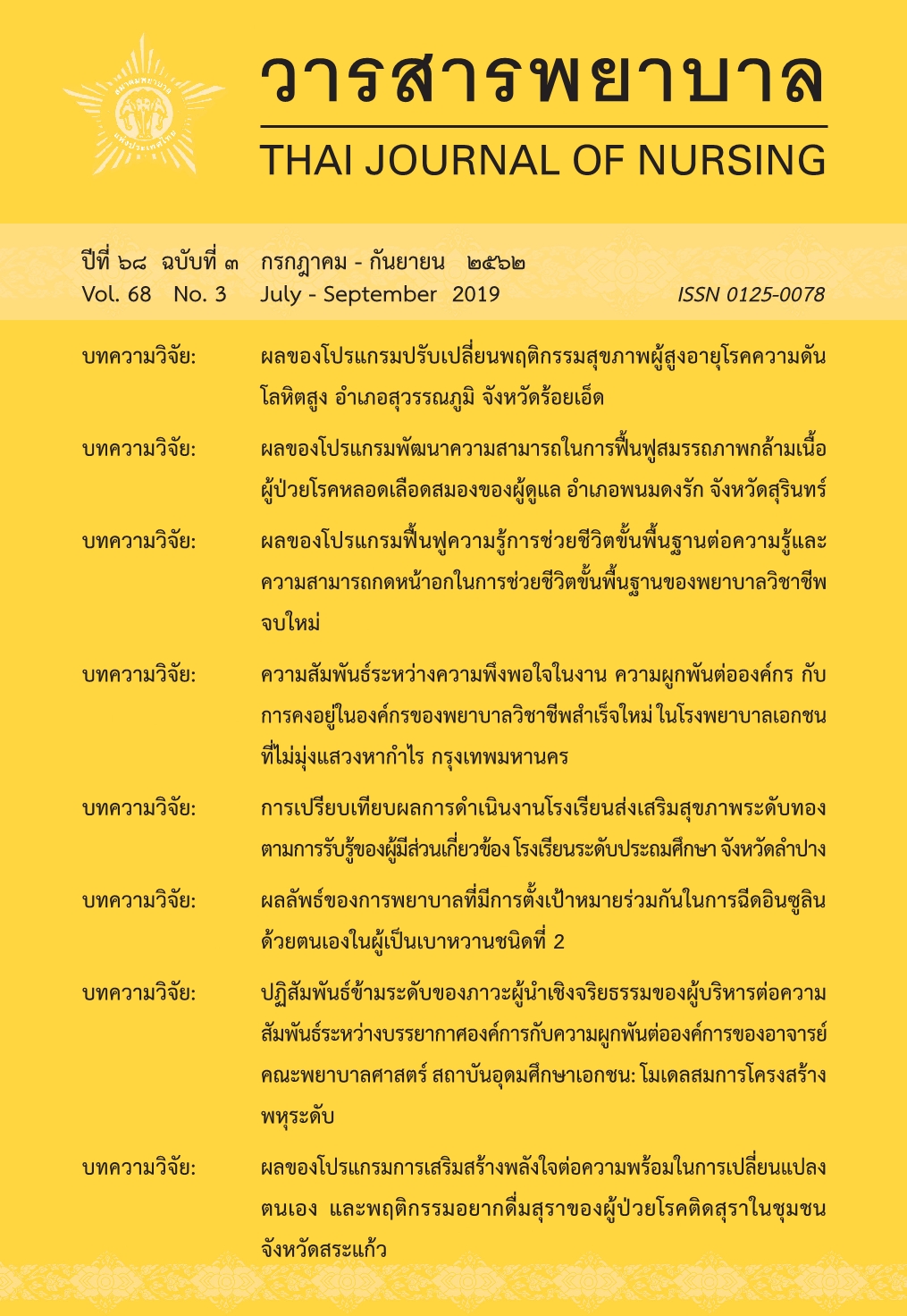A cross level interaction of administrators’ ethical leadership on the relationship between organizational climate and organizational commitment of the instructors in Faculties of Nursing of the Private Higher Educational Institutions: A multi-level structural equation model
Main Article Content
Abstract
This explanatory research was intended to (1) develop a multi-level structural equation model to explain the cross-level interaction of administrator’s ethical leadership on the relationship between organizational climate and organizational commitment of the instructors in faculties of nursing of the private higher educational institutions; (2) study the relationship between the administrator’s ethical leadership and the organizational commitment of the instructors; and (3) assess the cross-level effect of administrator’s ethical leadership on the relationship between organizational climate and commitment of the instructors in the prior-mentioned institutions. At the organizational level, the sample for this study were 22 institutions of nursing of private higher educational institutions, which 110 administrative staffs were identified to provide administrator’s ethical leadership data; while at the individual level, 528 instructors were randomly selected to provide data through questionnaires. Descriptive statistics, multi-level structural equation modelling, and cross-level interaction assessment were used for data analysis. The findings indicated that (1) the multi-level structural equation model of cross-level interaction of factors under study was well fitted with empirical data, and the multi-level structural equation model of the instructors’ organizational commitment was also consistent with empirical data with 2 = 1.011, df = 1, p-value = 0.314, RMSEA = 0.005, CFI = 1.00, TLI = 1.00, SRMR Within = 0.001, and SRMR Between = 0.032 respectively. (2) for fixed effect, it was found that the administrator’s ethical leadership had no effect on instructors’ organizational commitment. For random effect, in each institution there was significant difference among institutions at .01 level. However, (3) the study found no cross-level effect of administrator’s ethical leadership on the relationship between organizational climate and commitment of the instructors.
Article Details
References
กรุ๊ป.
ปิยรัฐ ธรรมพิทักษ์. (2558). โครงสร้างความสัมพันธ์เชิงสาเหตุพหุระดับของตัวแปรเชิงเหตุและภาวะผู้นำ
เชิงจริยธรรมของผู้บริหารที่มีผลต่อจิตลักษณะและพฤติกรรมที่เกี่ยวกับการทำงานของพนักงานใน
องค์การเอกชน (ดุษฏีนิพนธ์ปริญญาดุษฎีบัณฑิต ไม่ได้ตีพิมพ์). มหาวิทยาลัยศรีนครินทรวิโรฒ,
กรุงเทพมหานคร
มณี ชัยทัพ. (2555). ความสัมพันธ์ระหว่างบรรยากาศองค์การกับความยึดมั่นผูกพันต่อองค์การของพยาบาล
วิชาชีพในโรงพยาบาลส่งเสริมสุขภาพตำบล จังหวัดมหาสารคาม(วิทยานิพนธ์ปริญญามหาบัณฑิต
ไม่ได้ตีพิมพ์). มหาวิทยาลัยขอนแก่น, ขอนแก่น.
มณี อาภานันทิกุล, วรรณภา ประไพพานิช, สุปาณี เสนาดิสัย, และพิศสมัย อรทัย. (2557). จริยธรรมใน
การปฏิบัติการพยาบาลของพยาบาลไทย ตามการรับรู้ของผู้บริหารทางการพยาบาล. วารสารสภาการ
พยาบาล, 29(2), 5 -20.
วัชราพร เชยสุวรรณ, รุ่งทิพย์ ช้างศิลา, รัชนี ศุจิจันทรรัตน์, และวัลลภา บุญรอด. (2556). ปัจจัยที่สัมพันธ์
กับการคงอยู่ในงานของอาจารย์. วารสารพยาบาลทหารบก, 14(1), 51-60.
สุดารัตน์ พิมลรัตนกานต์, และวิโรจน์ เจษฎาลักษณ์. (2560). อิทธิพลของการรับรู้บรรยากาศองค์การผ่าน
ความ พึงพอใจในงานและความผูกพันต่อองค์การที่มีผลการปฏิบัติงานตามบทบาทหน้าที่. Veridian
E Journal, Silpakorn University, 10(2), 1611-1629.
สภาการพยาบาล. (2556). ข้อบังคับสภาการพยาบาลว่าด้วยหลักเกณฑ์การรับรองสถาบันการศึกษาวิชาการ
พยาบาลและการผดุงครรภ์ พ.ศ. ๒๕๕๖. สืบค้นเมื่อ 24 ตุลาคม 2561, จาก http://www.ratchakitcha.soc.go.th
อัณชิษฐา ร่มรื่น. (2552). การศึกษาเปรียบเทียบการรับรู้บรรยากาศองค์การและความผูกพันต่อองค์การ
ระหว่างพนักงานระดับปฏิบัติการฝ่ายผลิตกับพนักงานสำนักงาน บริษัทเอกชนแห่งหนึ่งในจังหวัด
ระยอง (งานนิพนธ์ปริญญามหาบัณฑิต ไม่ได้ตีพิมพ์). มหาวิทยาลัยบูรพา, ชลบุรี.
Khamvone Khonevixan และอำนาจ ธีระวนิช. (2017). ผลกระทบของภาวะผู้นำเชิงจริยธรรม ความพึง
พอใจในงาน ความผูกพันต่อองค์การที่มีต่อความตั้งใจลาออกของพนักงานบริการส่วนหน้าของ
โรงแรม นครหลวงเวียงจันทน์สาธารณรัฐประชาธิปไตยประชาชนลาว. งานวิจัยนำเสนอในการ
ประชุมวิชาการและนำเสนอผลงานวิจัยระดับชาติ ราชธานีวิชาการ ครั้งที่ 2 เรื่อง การวิจัย 4.0 เพื่อการ
พัฒนาประเทศสู่ความมั่นคง มั่งคั่ง และยั่งยืน, อุบลราชานี.
Boakye, I. (2017). Effects of ethical leadership and organizational climate on employee job involvement.
European Journal of Management and Marketing Studies, 2(2), 144-159.
Chan, M. F., Luk, A. L., Leong, S. M., Yeung, S. M., & Van, I. K. (2009). Factors influencing Macao
nurses' intention to leave current employment. Journal of Clinical Nursing, 18 (6), 893-901.
Cohen, J. (1992). Quantitative methods in psychology: A power primer. Psychological Bulletin, 112(1),
155-159.
Gucel, C., Tokmak, I., & Turgut, H. ( 2012) . The relationship of the ethical leadership among the
organizational trust, affective commitment and job satisfaction: Case study of a University.
International Journal of Social Sciences and Humanity Studies, 4(2), 101-110.
Heck, R. H., Thomas, S. L., & Tabata, L. N. (2010). Multilevel and longitudinal modeling with IBM
SPSS: Quantitative methodology series. New York: Routledge.
Heck, R. H., & Thomas, S. L. (2015). An introduction to multilevel modeling techniques MLM and SEM
approaches using M plus. New York: Routledge.
Kelloway, E. K. (2015). Using Mplus for structural equation modeling: A researcher’s guide (2nd ed.).
San Diego, CA: SAGE.
Siegel, P. G. (2013). Ethical leadership and organizational commitment in the Canadian Armed
Forces: An analysis of perceived supervisor ethical leadership as a predictor of organizational
commitment in a Canadian Armed Forces sample (Unpublished Master’s Thesis). Saint Mary’ s
University, Halifax, Nova Scotia.


